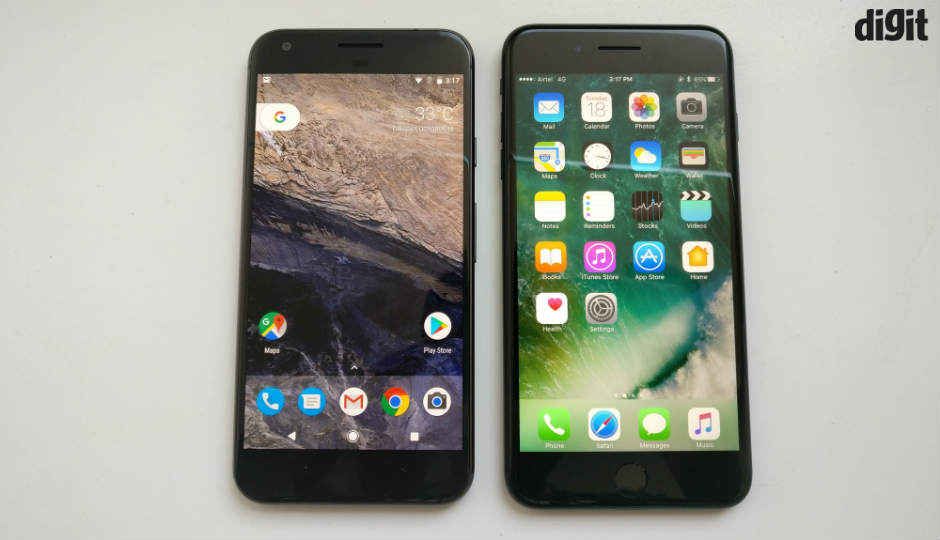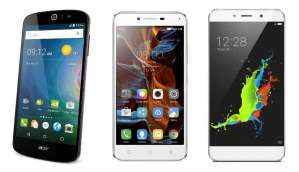Apple iPhone 7 Plus v. Google Pixel XL: The flagship camera faceoff
The two smartphones here, Apple iPhone 7 Plus and Google Pixel XL, have both claimed to have included the world's best smartphone cameras ever built. Each has its pros, but there are areas where both compromise. Here's looking at who walks away with the title.
The Apple iPhone 7 Plus, launched about a month back, joined the bandwagon of dual-camera smartphones and put a claim on the throne for the best smartphone camera ever built. Shortly after that, Google followed up with the Pixel XLWhere to buy 67000, flaunting a DxOMark rating of 89 and joining the flagship smartphone camera race.
In such a scenario, it was only natural for us to pit the two against each other. The two cameras are very different in nature. The iPhone 7 Plus uses two cameras, one with a 28mm, f/1.8 lens and the other with a 56mm, f/2.8 lens, to deliver 2x optical zoom without any moving lens elements. It also focuses on bokeh, or artistically soft backgrounds (typically produced by more equipped prime lenses of dedicated cameras), when shooting with the wide angle lens. With all of this, Apple assures, the iPhone 7 PlusWhere to buy 72000
72000
82000 should be adept at producing good photographs.
Apple iPhone 7 PlusWhere to buy 72000
72000
82000
Google Pixel XLWhere to buy 67000
The Google Pixel XL, meanwhile, puts its focus entirely on photograph quality. The Pixel XLWhere to buy 67000 is expected to produce stellar photographs, and is paired with a 12.3MP Sony IMX378 image sensor, which is the very best of Sony’s present generation image sensors. The exact specifications have not been mentioned yet, but our calculations seem to suggest that it is a 1/2.5-inch sensor, larger than the 1/3-inch and 1/3.6-inch sensors on the iPhone 7 PlusWhere to buy
72000
72000
82000. Google has also capitalised on Sony’s Spatial Multiplex Exposure HDR (SME-HDR) mechanism, relying heavily on its HDR+ mode.
With the two very different cameras at hand, we look at how they perform in everyday shooting. Here we go!
Bright Daylight
We begin with the one ambience that is possibly where most of your photographs will be shot. Photography under daylight also brings out the best in cameras, and the iPhone 7 Plus and Pixel XL both produce impressive results. Both produce a good array of details, along with pleasant colours and a good balance of imaging attributes.
Apple iPhone 7 PlusWhere to buy 72000
72000
82000
Google Pixel XLWhere to buy 67000
However, in comparative analysis, the Google Pixel XLWhere to buy 67000 produces better levels of detail in its photos. 100% crop of photos shot by the Pixel XL reveal higher subject sharpness and greater details. In every daylight photograph, the Google Pixel produces noticeably richer details, making overall photographs look crisp. However, the Pixel XL loses out on accuracy of white balance, which in turn affect colours.
Apple iPhone 7 PlusWhere to buy 72000
72000
82000
Google Pixel XLWhere to buy 67000
With its two-camera setup, the iPhone 7 Plus produces a more accurate white balance. It renders slightly warmer colours than its real surroundings, but the optimisation of light and contrast in the photographs make photographs retain vibrancy, while seeming closer to the real ambience. This somewhat makes up for lesser details than the Google Pixel XLWhere to buy 67000, effectively rendering more appealing photographs. The 100% crop photographs show the difference in colours very effectively.
Indoor
The story here is fairly similar to how the two smartphones shoot in daylight. In terms of colours, the iPhone 7 PlusWhere to buy 72000
72000
82000 produces very true-to-source colours. The Pixel XLWhere to buy
67000, meanwhile, ends up losing out on colour accuracy. The colour tone itself is different from the source, and despite better details, this hands the onus over to the iPhone 7 Plus. There is a distinct tone of desaturation in the colours, and although the contrast in photographs match well with the level of brightness, the colours are the major spoilsport.
Apple iPhone 7 PlusWhere to buy 72000
72000
82000
Google Pixel XLWhere to buy 67000
It would have even been possible to excuse the Pixel XLWhere to buy 67000, had the colours showed minimal oversaturation or desaturation, but the blues and greens are significantly off the mark. The iPhone 7 PlusWhere to buy
72000
72000
82000 cashes in on this, rendering good details along with more accurate colour tones and white balance. Both the smartphones render minimal or no image noise in well-lit situations.
Low Light
The larger pixels on the IMX378 sensor lead to brighter photographs at night or in low light conditions. However, the Pixel XLWhere to buy 67000 loses out on the excellent details that it renders in well-lit conditions. Colours are still off the mark, but the lack of crisp details is the particularly worrying bit. From what it seems, the lack of optical stabilisation on the Pixel XL can be an impactful point. The Pixel XL shot at 1/14” shutter speed in low light conditions, while the iPhone 7 PlusWhere to buy
72000
72000
82000 shot at 1/4”. However, while the level of details remained fairly constant on the iPhone 7 Plus, the Pixel XL loses out majorly on it.
Apple iPhone 7 PlusWhere to buy 72000
72000
82000
Google Pixel XLWhere to buy 67000
The image stabilisation of the iPhone 7 PlusWhere to buy 72000
72000
82000 is evident with the sharper subjects, while the electronic image stabilisation of the Pixel XLWhere to buy
67000 is not too effective here. Both the cameras fare similarly in terms of image noise, with the iPhone 7 Plus rendering comparatively finer image noise than the Pixel XL. Both, however, produce rather coarse image noise.
The best camera smartphone
The Google Pixel XLWhere to buy 67000 is still a very competent camera smartphone, with only the unpredictability of colour tone hampering its class-leading image details and sharpness. The iPhone’s image signal processor brings with itself an incredibly balanced algorithm, which leads to more balanced and true-to-source colours, along with controlled levels of saturation, contrast and overall colour details.
Apple iPhone 7 PlusWhere to buy 72000
72000
82000
Google Pixel XLWhere to buy 67000
In terms of image noise, however, both perform similarly. The Pixel XLWhere to buy 67000 and iPhone 7 PlusWhere to buy
72000
72000
82000 are the very best of smartphone cameras, and had it not been for the bias towards cool colour tones, the Pixel XL could have been the best camera smartphone out there.
The iPhone 7 Plus also has a wider aperture lens, which produces softer backgrounds. This effectively will contribute to better bokehs, possibly the best for a smartphone camera. With an f/2.0 lens, the Pixel XL produces the industry average from smartphones with f/2.0 lenses. All things considered, the iPhone 7 Plus is the better of the two smartphone cameras in the market right now, with the Google Pixel XLWhere to buy 67000 following up as a close second.
Other Popular Deals
Interesting Galleries
 14 upcoming mobile phones you should expect in India in 2016
14 upcoming mobile phones you should expect in India in 2016 Best camera phones under Rs. 15,000 (July 2016)
Best camera phones under Rs. 15,000 (July 2016) Best smartphones under Rs. 15,000 with great battery backup
Best smartphones under Rs. 15,000 with great battery backup 10 smartphone sequels to look forward to in 2015
10 smartphone sequels to look forward to in 2015![10 best smartphones between Rs. 10,000 to Rs. 20,000 [June 2015]](https://lh3.googleusercontent.com/blogger_img_proxy/AEn0k_ticYI0t57xYkRKzwLXwgmG5-a8xfbOVLrplxeT9zVXh0OP8iP2TAjvPakB9s4c_xUuQJf-uTT_6lLEpJWZMGfXRvokjSfveyutQyfDGd2SESltkrFUvjZIyoL1McxDPTH4ePoesA=s0-d) 10 best smartphones between Rs. 10,000 to Rs. 20,000 [June...
10 best smartphones between Rs. 10,000 to Rs. 20,000 [June... 26 upcoming & latest smartphones to check-out
26 upcoming & latest smartphones to check-out![Slimmest phones you can buy in India [June 2015]](https://lh3.googleusercontent.com/blogger_img_proxy/AEn0k_tiozZCSTnI5inc-RewJVpznpM0eXrSUCvHFB4ycPqgcB1o1ouwLmD6iHpBTuxW8QbQCFaEjYoaCRRv37FodymoNQUH6s7axQZFbmBbgfPNHDMvUtn4Qi3IHtYlRmmEVRS5Eg4H1g=s0-d) Slimmest phones you can buy in India [June 2015]
Slimmest phones you can buy in India [June 2015] The best upgrade options for 10 classic smartphones
The best upgrade options for 10 classic smartphones Huawei P8: First Look
Huawei P8: First Look Xiaomi Mi4i vs Asus Zenfone 2 (2GB): Quick Comparison
Xiaomi Mi4i vs Asus Zenfone 2 (2GB): Quick Comparison LG G4: First Look
LG G4: First Look Asus Zenfone 2 and Zenfone Selfie: In Pictures
Asus Zenfone 2 and Zenfone Selfie: In Pictures Sony's current & upcoming Xperia phones: An Overview
Sony's current & upcoming Xperia phones: An Overview Micromax Canvas Sliver 5: First Look
Micromax Canvas Sliver 5: First Look Sony Xperia C4: First Look
Sony Xperia C4: First Look Coolpad Dazen X7 and Dazen 1: In pictures
Coolpad Dazen X7 and Dazen 1: In pictures
The Apple iPhone 7 Plus, launched about a month back, joined the bandwagon of dual-camera smartphones and put a claim on the throne for the best smartphone camera ever built. Shortly after that, Googl...
---------------------------------------------------------------------------
Visit this link to stop these emails: http://zpr.io/PnAEp







![10 best smartphones between Rs. 10,000 to Rs. 20,000 [June 2015]](http://static.digit.in/default/thumb_38248_default_td_160.jpeg?v=1)

![Slimmest phones you can buy in India [June 2015]](http://static.digit.in/default/thumb_40062_default_td_160.jpeg?v=1)








